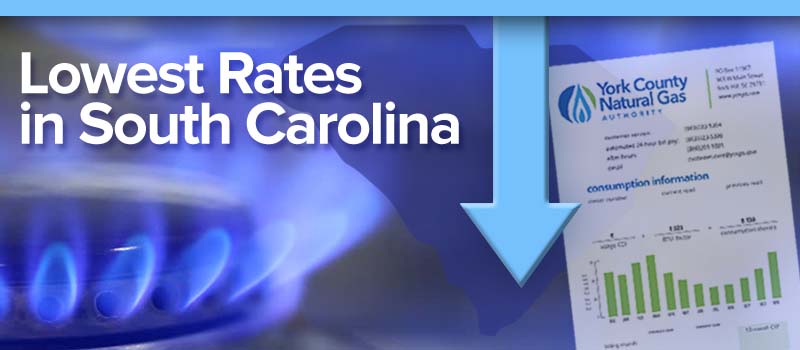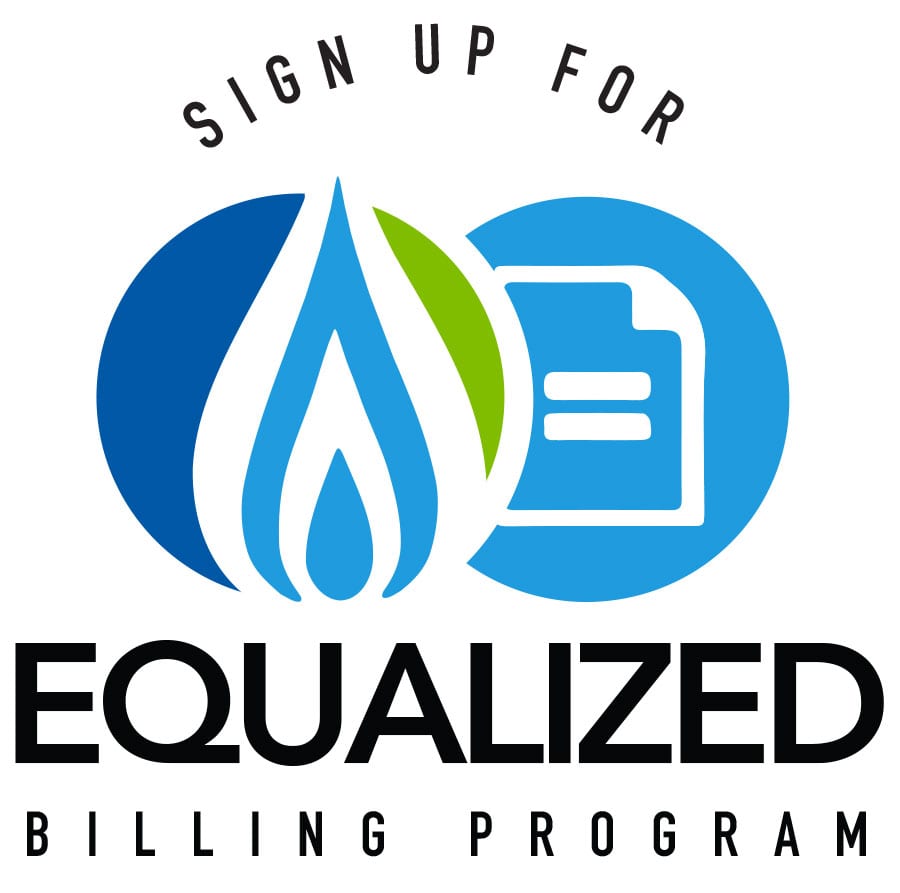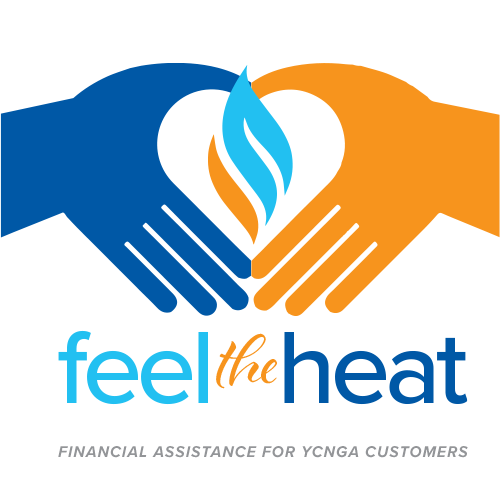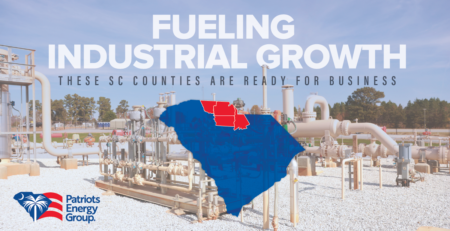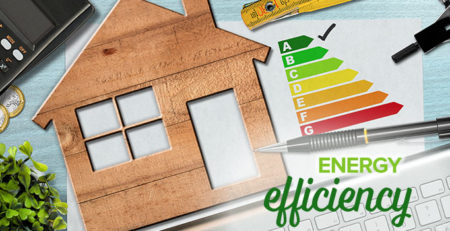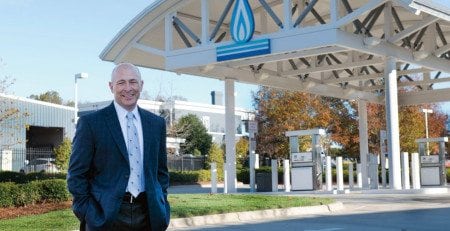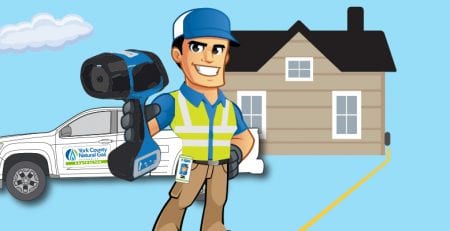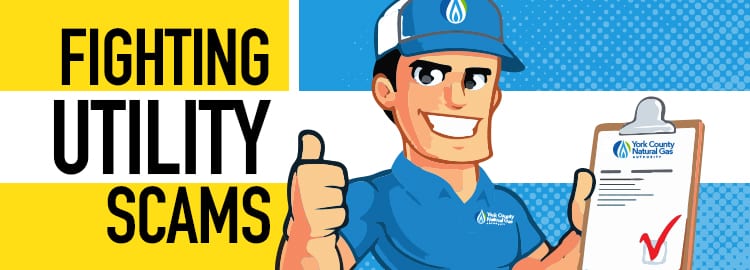Winter 2021 Gas Rates
Good News about Natural Gas Rates
In York County & Blacksburg, SC
Energy prices are spiking across the United States, but for customers of York County Natural Gas Authority (YCNGA), consumer rates are nearly the same as they were last year at this time. While the commodity price of natural gas has doubled over the past year, YCNGA has taken several steps to help mitigate the fluctuation in prices, which in turn provides stable rates for our customers.
Energy costs have risen dramatically over the past several months and the Department of Energy, who analyzes energy costs across the nation, predicts that consumers will spend 30% more on heating than they spent last winter. That’s not the case locally where YCNGA has secured stable, discounted natural gas supplies through long-term prepayment agreements and sound price hedging practices.
Overall this year, YCNGA customers may experience an increase of 3.5% over their bills from last year. To put that into context, a customer using natural gas for space heating, cooking and water heating, who typically incurs around $100 in charges for January, will have a bill of $103.50.
Why Are Energy Costs Rising?
Natural gas is known to be a volatile commodity. Currently wholesale prices are up over 100% from last year for a number of reasons. The United States has a large supply of natural gas and now exports much of that energy to countries overseas who are willing to pay top dollar. That leaves less in reserves for the winter heating season. Additionally, there’s been a greater demand for energy during this pandemic as more people and students are working/studying from home. Finally, winter weather projections play a significant role in natural gas price fluctuations.

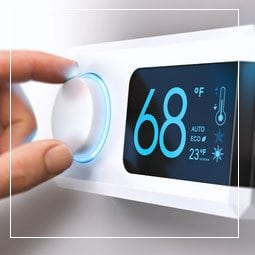
Cold weather is the factor that most influences a customer’s bill. Since natural gas is typically used for heating, colder temperatures increase usage which causes higher utility bills. Only a few days of extremely cold temperatures can cause your bill to be higher because your heating system runs more frequently and for longer periods of time. Energy.gov recommends setting the thermostat to 68° to save money, then lowering the thermostat when leaving home or at night while sleeping.
Do you set your thermostat at a specific temperature and never touch it? You could be wasting as much as $180/year, according to ENERGY STAR. You can easily save energy in the winter by setting the thermostat to 68°F while you’re awake and setting it lower while you’re asleep or away from home.
Reduce the thermostat temperature setting whenever you leave your home for 8 hours or longer. After all, there’s no need to heat an empty house to the same temperature as when you’re home, right? If you’re heating the house for your pets, remember they have fur coats!
Do this:
- When your home will be empty for 8 hours or longer, set the thermostat 7°-10° lower in the winter.
- When you get home, set the thermostat back to a comfortable setting – 68° is recommended.
Doing so can save as much as 10% on yearly energy costs, according to the U.S. Department of Energy.
YCNGA prepares for the coldest day of the year and has agreements in place with sufficient capacity to meet its peak days through 2027. Continued growth in the region presents a challenge, but as a public utility YCNGA is committed to reinvesting its earnings each year into maintaining stable rates while expanding and strengthening the natural gas infrastructure.
YCNGA works hard to maintain stable rates for customers.
In a recent South Carolina residential rate comparison, YCNGA provides its customers the lowest rates in the state.
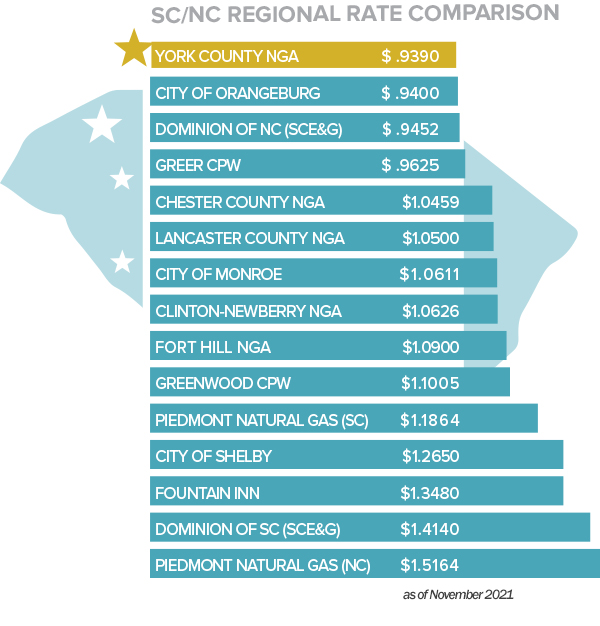
How to be more energy efficient in the winter and reduce your bill
ENERGY SAVING TIPS: 
Install a PROGRAMMABLE THERMOSTAT and set it properly
CLOSE VENTS and doors to unused areas
DRESS IN LAYERS
CHECK WINDOWS AND DOORS for gaps – use towels or blankets to block gaps
KEEP BLANKETS HANDY
OPEN CURTAINS to rooms facing the sun, but CLOSE THEM when the sun goes down
FIND AND STOP DRAFTS from coming through electrical outlets, holes in exterior walls, and from doors and windows.
ADD INSULATION to your existing home. Insulating your entire home with foam insulation can make your home warmer and more comfortable while saving you money on natural gas bills. Insulating the entire home – attic, walls, crawl space, and rim joist – is recommended as every area works together as a system. Only insulating the walls will not help with cold floors, just like insulating your attic won’t help with cold walls.
Check your HVAC FILTERS MONTHLY and change them when dirty, or according to manufacturer guidelines.
CHECK YOUR DUCT WORK for leaks or tears and repair fallen or crushed ducts.
Find more tips from energy.gov
Billing Options – Equalized Billing Program
The best way to avoid being surprised by a high natural gas bill is to enroll in our Equalized Billing Program. With this method of budget billing, your natural gas costs stay the same each month for a year. If you’re eligible, we will average your 12 previous monthly bills and estimate the charges for the next 12 months, then divide your predicted energy use into 11 equal monthly payments. On the 12th month we compare the estimated usage to the actual usage and then apply a credit due, or bill the outstanding balance.
Instead of big natural gas bills in the winter, you can spread those expenses across the whole year and be much friendlier to your budget. The Equalized Billing Program is open for enrollment during the month of May. Mark your calendars, and sign up this year!
Payment Assistance
Need assistance with your bill?
We recognize that high heating bills impose a hardship, especially for elderly or disabled customers on a fixed income. Heating assistance is available through our Feel the Heat Fund. The Feel the Heat Fund is funded by customers and employees who donate directly to the fund by adding a dollar or more each month to their bill payment. Donations are collected by YCNGA and distributed by partner agencies. We’ve recently expanded the program to help more in need. If you or someone you know may qualify for assistance, contact a partner agency to apply. Learn more…
The Good News!
Although it’s cold in S.C. and you’re using more energy, know that you’re not alone. According to the U.S. Department of Energy, nearly half of all households use natural gas to heat their homes. The good news – natural gas costs less to use than other major home energy sources! Gas rates in York County have stayed relatively stable for several years not fluctuating more than a few pennies in either direction. Currently gas rates for residential customers are the lowest in the state.


